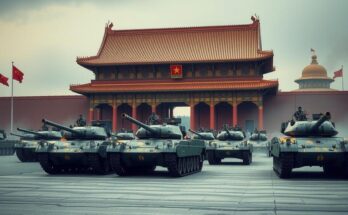South Sudan is experiencing increased political tensions between President Salva Kiir and First Vice President Riek Machar, risking a return to civil war. Analysts note that deep mistrust and violence, marked by military clashes and political arrests, threaten the 2018 peace agreement. Urgent regional mediation is needed to de-escalate these tensions and address leadership disputes effectively.
South Sudan currently faces heightened fears of a renewed civil war as tensions escalate between President Salva Kiir and First Vice President Riek Machar. The situation has intensified due to violent clashes and significant arrests among political and military figures, jeopardizing the fragile peace established by the 2018 agreement. Experts indicate that the deepening mistrust between the two leaders is a key factor in the potential for increased instability.
The political crisis was exemplified by President Kiir’s dismissal of three ministers, which appears linked to the ongoing tensions. This move followed a US evacuation order for non-emergency personnel citing security risks heightened by increased civilian weapons access. Regional organizations, notably the Intergovernmental Authority on Development (IGAD), have sought to mediate this volatile situation, calling for an extraordinary summit to address the escalating crisis.
Since gaining independence in 2011, South Sudan descended into civil war just two years later. Although the 2018 peace agreement between Kiir’s and Machar’s factions halted major conflict, critical reforms, including disarmament and election preparations, remain unfulfilled. A recent escalation of violence has occurred, beginning with a militia attack on an army base in Nasir, which is strategically located near the South Sudan-Ethiopia border.
The unrest gained momentum on March 4, when Machar’s linked militia, known as the White Army, seized control of the Nasir army base, stemming from tensions over the replacement of longstanding soldiers. Following violent clashes, an attack on a UN helicopter aimed at evacuation resulted in at least 27 fatalities, highlighting the severe nature of the ongoing conflict.
Analysts emphasize that a profound deficit of trust between Kiir and Machar underpins South Sudan’s instability, rooted in accusations of non-compliance with peace initiatives that date back to December 2013. The International Crisis Group has warned of South Sudan slipping towards renewed conflict, echoing similar sentiments from experts urging urgent discussions to resolve leadership disputes and enhance the peace process.
The UN Commission on Human Rights has also cautioned that current political and social unrest threatens the integrity of the 2018 peace agreement, advocating for the prioritization of human rights and democratic objectives over divisive actions. The precarious power-sharing deal continues to falter; without cooperative efforts to implement the agreement effectively, warnings of renewed civil war grow more pronounced.
The escalating tensions between President Salva Kiir and First Vice President Riek Machar present a critical risk of renewed conflict in South Sudan. Analysts highlight that a failure to foster dialogue and trust between these leaders could lead to a regression into civil war. The ongoing violence and political instability not only threaten the 2018 peace agreement but also the overall prospects for meaningful democratic progress in the nation. Urgent mediation and commitment to the peace process are essential to avert further deterioration.
Original Source: www.aa.com.tr




